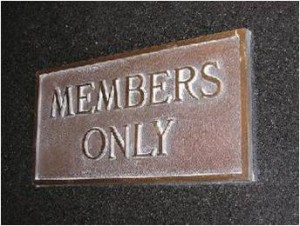By Doug Stephens
The world is an increasingly inclusive place and as a society, we’ve grown to expect equal and open access to just about everything. Facebook has become the ultimate online commune. Anyone can jump on a Groupon deal. There are no requisites to joining Foursquare, Flickr or almost any other web based social community. In fact, the web in general has in many ways become the truest expression of the idea of equal access and egalitarianism – the democratization of everything.
Exclusivity Works
But let’s also not forget when high school kids were lying about their age just to get a Facebook profile because Facebook was exclusively for college students? It could be argued that those early barriers to entry are what fuelled the mystique and excitement around Facebook. Membership became coveted and cherished.
The truth is that we like exclusivity. We prize gaining access to places that others can’t. We relish having privileges that others don’t enjoy. We all long to know “the secret handshake” that takes us where others can’t go.
That’s why I believe we’re poised to see a gradual but steady shift toward a decidedly less inclusive web. This is not to say communities like Facebook won’t continue to grow but that people will slowly begin to seek deeper, more valuable and ultimately more exclusive communities to belong to.
In fact, the evolution of exclusion is already underway with a number of communities requiring certain criteria of their membership. Path.com, for example, calls itself a “personal site” that limits users to linking with a maximum of 50 friends. Collegeonly.com, picks up where Facebook began by creating a social network exclusively for college students. A Small World, has been called “MySpace for millionaires”. There’s even a site for beautiful people, aptly named beautifulpeople.com, where user’s photographs are actually voted on prior to being granted access. That’s right, no ugly people allowed!
A Shift Retailers Should Heed
One of my favorite sayings when it comes to trends is “Don’t look at the finger, look at where it’s pointing.” In other words, while sites like beautifulpeople.com may strike us as nothing more than tasteless elitism, they point to the underlying human need to feel special, unique and valued via exclusive membership. Something we don’t see a great deal of in retail.
Retailers on the other hand have inundated us with free memberships and loyalty programs. It seems that every retailer has a program and just about anyone can join them. There’s no cost or prerequisite to becoming a member and not surprisingly the benefits are often disappointing. As a consequence, we begin to shy away from loyalty programs altogether. After all, if anyone qualifies, how valuable can it really be?
Some brands like Starbucks and Lululemon have hinted at a sense of exclusivity by creating a strong culture complete with their own product languages. Others, like Neiman Marcus and Saks have excluded largely through pricing. Even sites like Gilt Groupe and Rue La La have built their businesses on a by-invitation-only model – although getting an invitation isn’t a challenge. Costco is perhaps the most exclusive with its flat-out membership fee.
I would argue, though, that there’s an opportunity to take the notion of exclusivity much farther, creating private customer communities that are so experiential, enjoyable and value- added that consumers would clamour for access. Unlike more banal retail loyalty programs the potential exists to build members-only branded communities offering everything from social connections through to exclusive media, products and even live events. Imagine belonging to a branded social network so exclusive and valuable you’d be willing to pay to belong!
This runs completely contrary to the D.N.A of many marketers who have come to regard success as providing reasonable value to as many people as possible. In exclusive communities by contrast, success lies in creating enormous value for only your very best or most influential customers…the chosen few as it were. It means creating deep brand experiences for some instead of shallow brand experiences for all.


